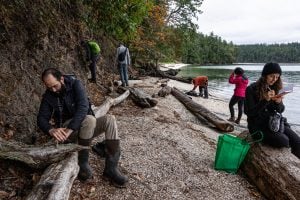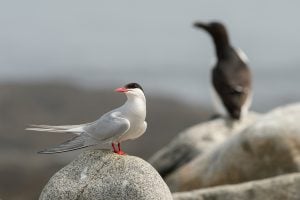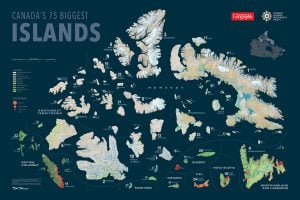Prince Edward Island may be small in size, but its drive to become carbon neutral rivals that of Canada’s larger provinces and territories. Case in point: Marc and Krista Schurman, owners of Atlantic Grown Organics in Kensington, have partnered with the provincial government to become the first in Canada to heat their 1.6-hectare greenhouse operation entirely with locally-sourced biomass, the term for organic matter.
“We certainly have a long history of innovation in biomass heat,” Marc explains. “One that spans two generations.”
In the mid-1980s, Marc’s father installed a boiler system fuelled by round bales of straw. Later, Marc traded the straw for wood chips and oilseed byproduct sourced from a neighbouring farm.
Expanding the greenhouse in 2017 forced the Schurmans to supplement biomass with fuel oil. For a family that had been so committed to green and sustainable farm management, relying on fossil fuels did not sit well. That’s when they found the perfect solution. Accessing over $800,000 in available federal and provincial government grants, they purchased two 1250kw Austrian-made Herz Energietechnik BioFire boilers.
“On P.E.I., we have a great network of organic producers and a provincial government that has been very supportive at advancing our industry,” Marc says.
Marie-Claude Bibeau, federal Minister of Agriculture and Agri-food, points out that Ottawa is also committed to supporting research into sustainable agriculture practices.
“This project showcases how the ingenuity of our farm families in adopting new technologies can help Canada be a leader on sustainable farming and food,” she says.
While biomass-fuelled boiler systems are not new in Canada, the one that the Schurmans are using is.
The BioFire’s two-stage combustion process first burns biomass for heat then burns up the methane that is produced during that first stage. Not only does the BioFire completely eliminate the need for fuel oil, but its operation is carbon neutral. The Schurmans say that this new boiler system can offset 2.1 million kilograms of carbon dioxide annually, equivalent to removing more than 400 cars from the road. Better yet, buying locally-sourced biomass puts $100,000 back into the province’s economy.
“The Herz was a tough decision,” Marc admits, “but one we have been very pleased with. We investigated many different possibilities both in Canada and Europe and found that the Herz was the most efficient and robust, and it had the added benefit of having service available locally. It is designed to meet European emissions regulations, which are far stricter than Canadian regulations.”
The Schurmans were pleasantly surprised by the number of people who attended an open house they held to introduce the Herz boilers and the support they continue to receive from the community.
“We can each do our part as farmers, landowners, and Islanders — to do more every day to help our island always improve for the next generation,” Marc says.
If the past 30 years are any indication, the Schurmans are well placed to make sure that happens.
“The entrepreneur farmer has so many opportunities today,” says Marc. “They are not easy. They are not obvious. But that makes it even more rewarding when you are able to succeed.”




